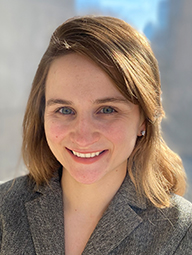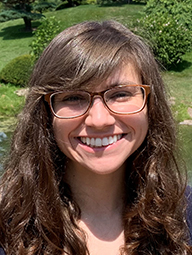December 1, 2022
Julie Rorrer and Alex Prybutok joined ChemE in 2022-23
Julie Rorrer
Assistant Professor

Julie steps into the role of assistant professor in ChemE in January 2023. Her expertise lies in sustainable chemical transformations, and her research will expand the department’s work on processes that decrease the carbon intensity of chemical production and mitigate the environmental impacts of waste. Julie earned her Ph.D. in chemical engineering from the University of California, Berkeley and completed a postdoctoral fellowship in the Yuriy Román-Leshkov group at the Massachusetts Institute of Technology.
Julie’s research centers on developing more-sustainable catalytic processes to enable chemical upcycling of waste plastics and catalytic upgrading of biomass-derived platform molecules. Traditional plastic recycling is better thought of as “downcycling,” she says, resulting in an inferior product and delaying the inevitable of landfill disposal. Her work approaches waste plastics differently and focuses on using milder, lower-energy reaction conditions to upgrade the material into useful chemical feedstock.
In choosing to join UW ChemE, Julie recognized how the department’s existing expertise in polymers, advanced materials, and modeling complemented her experimental approach. “More than that,” she said, “UW and its inclusive culture really drew me here. The UW values all the facets of my interests across research, teaching, and outreach.”
Within ChemE, she will be building out lab capacity to synthesize, characterize, and test catalytic materials in custom-built chemical reactors. In the teaching arena, she will focus on kinetics and catalysis, while keeping an eye on future opportunities to develop science communication training for students.
That’s a pursuit she’s especially passionate about. Julie is the founder and lead illustrator of the outreach initiative ColorMePhD, a free resource that uses coloring pages to communicate Ph.D.-level STEM research to a broad audience. To date, the pages have featured research from her home institutions as well as work done by underrepresented groups in STEM. She has brought in guest illustrators and translators to expand its scope and reach. Now, at the UW, the Clean Energy Institute will fund a postdoc position to study the project’s impact and further increase community engagement.
Alex Prybutok
Assistant Teaching Professor
 Alex Prybutok joined the ChemE faculty in the fall, bringing a wealth of experience in higher ed STEM instruction with a focus on inclusive pedagogy. She earned her Ph.D. in chemical engineering from Northwestern University, where she was co-advised by professors Josh Leonard and Neda Bagheri (now of UW). In her doctoral work, Alex conducted original research both on developing agent-based models of cell-based therapies in solid tumors, as well as on integrating a social justice context into chemical engineering courses.
Alex Prybutok joined the ChemE faculty in the fall, bringing a wealth of experience in higher ed STEM instruction with a focus on inclusive pedagogy. She earned her Ph.D. in chemical engineering from Northwestern University, where she was co-advised by professors Josh Leonard and Neda Bagheri (now of UW). In her doctoral work, Alex conducted original research both on developing agent-based models of cell-based therapies in solid tumors, as well as on integrating a social justice context into chemical engineering courses.
Alex’s passion for teaching extends back to grade school when she volunteered and later became an instructor at summer science camps for kids. Fast forward to her undergraduate studies at the University of Texas at Austin, where her experience with science and engineering prompted her to think about her own and other students’ sense of belonging in their fields. She pursued a Ph.D. in order to teach in higher ed and support students from a diversity of backgrounds on their paths to STEM careers.
Over the course of her Ph.D. training, Alex overlaid numerous teaching activities on her chemical engineering research. Increasingly, her pedagogical work focused on themes such as universal design for learning, which focuses on accessibility, and backwards course design, which puts learning objectives first.
Alex created and led a graduate teaching committee in Northwestern’s School of Engineering to assess how TAs were being trained and valued, and advised leadership on how to make improvements. Further, she led the development of a workshop to help instructors incorporate anti-racism, diversity, equity, inclusion, and social justice into science and engineering curricula.
At the UW, Alex is teaching courses including the Unit Ops labs and Reactor Design, while working to advance equity in engineering education. “I want to make classes more contextualized,” she said. “A lot of chemical engineering problems are very theoretical and detached from reality.” To make them more grounded in social justice, for example, one might understand not only a separation and the chemicals involved in it — but also connect it to why doing the separation well and minimizing harmful waste is important if a plant is located near communities that would be affected by its pollution.
In addition to teaching, Alex will further support students by taking on mentees and serving as a faculty co-adviser to the UW chapter of Women in Chemical Engineering (WChE).